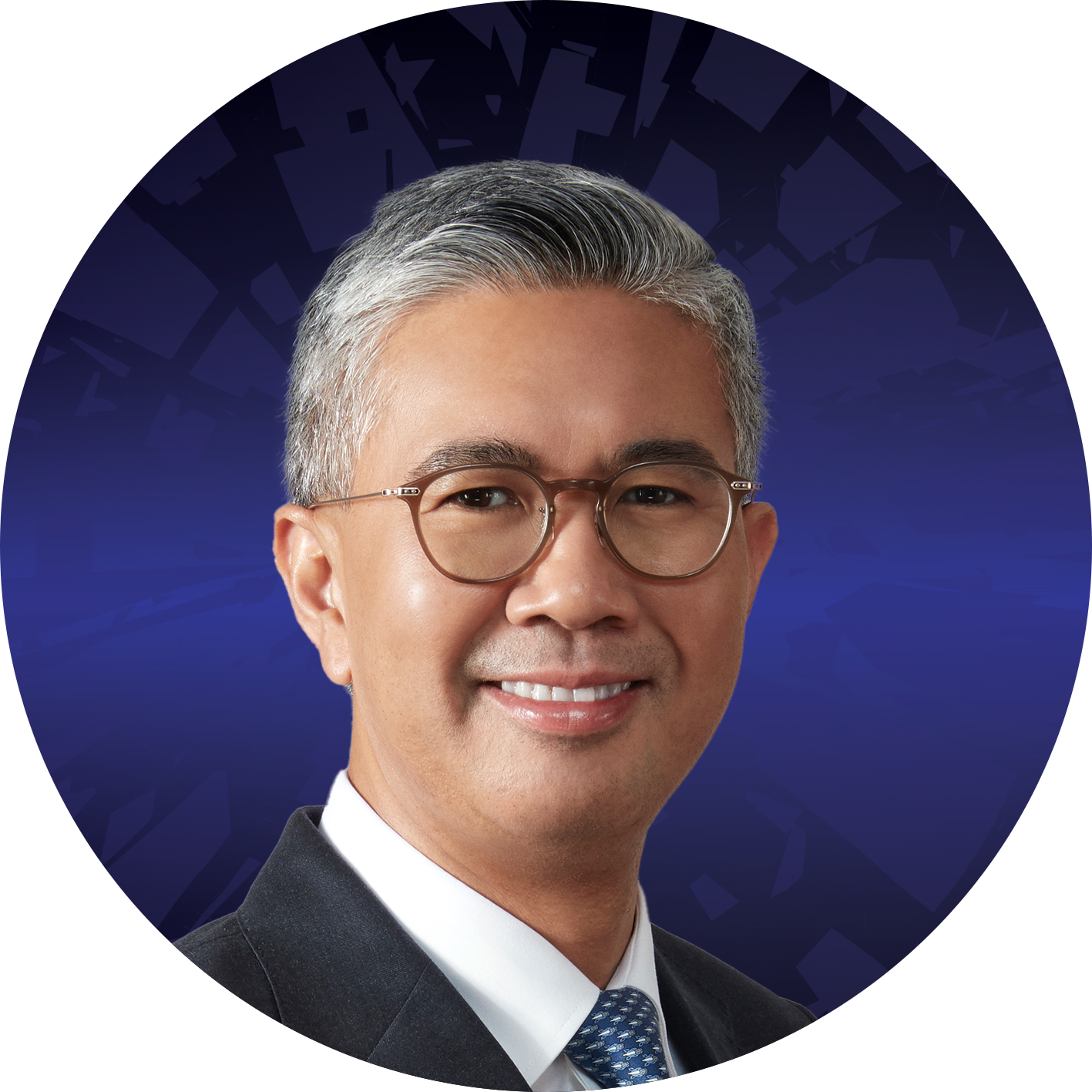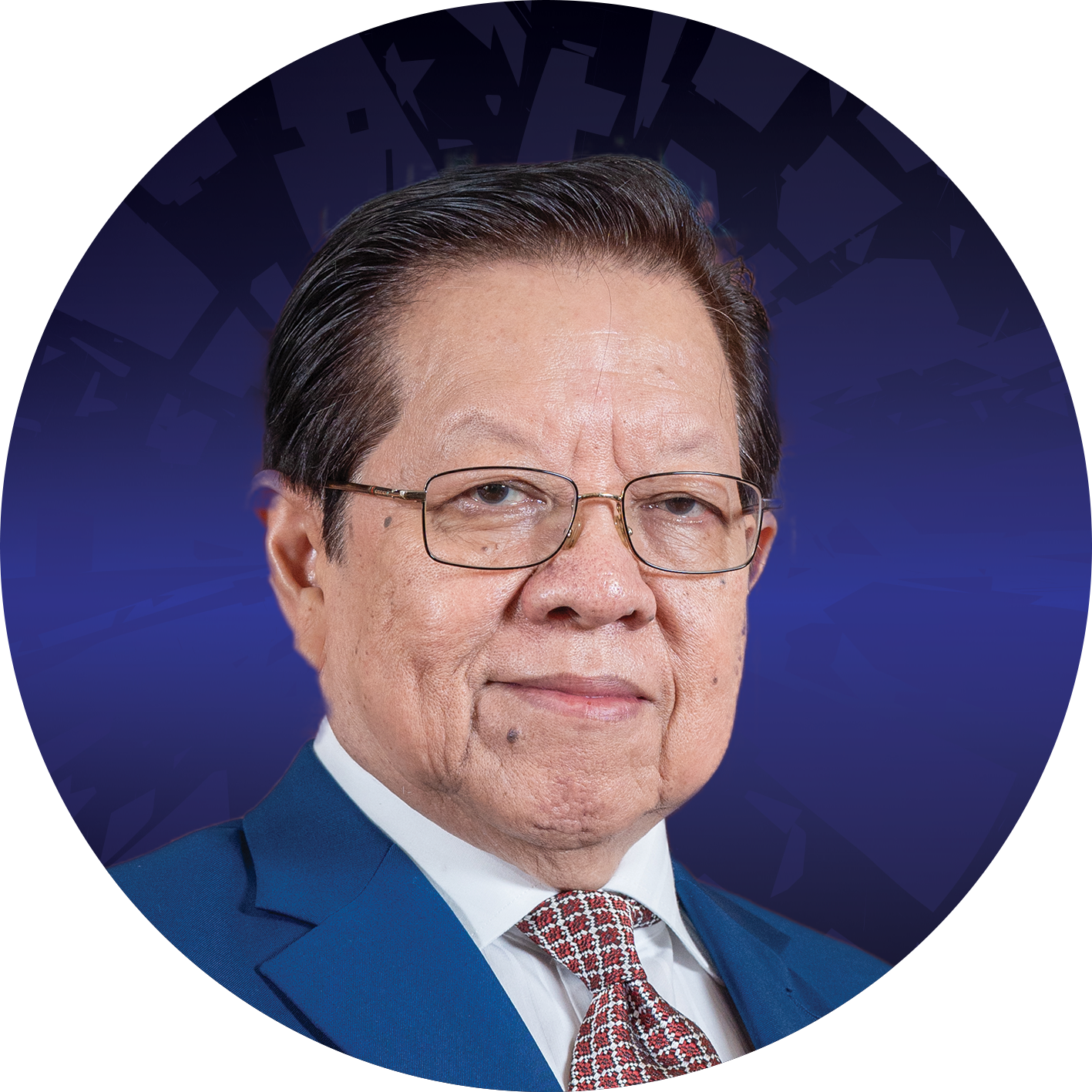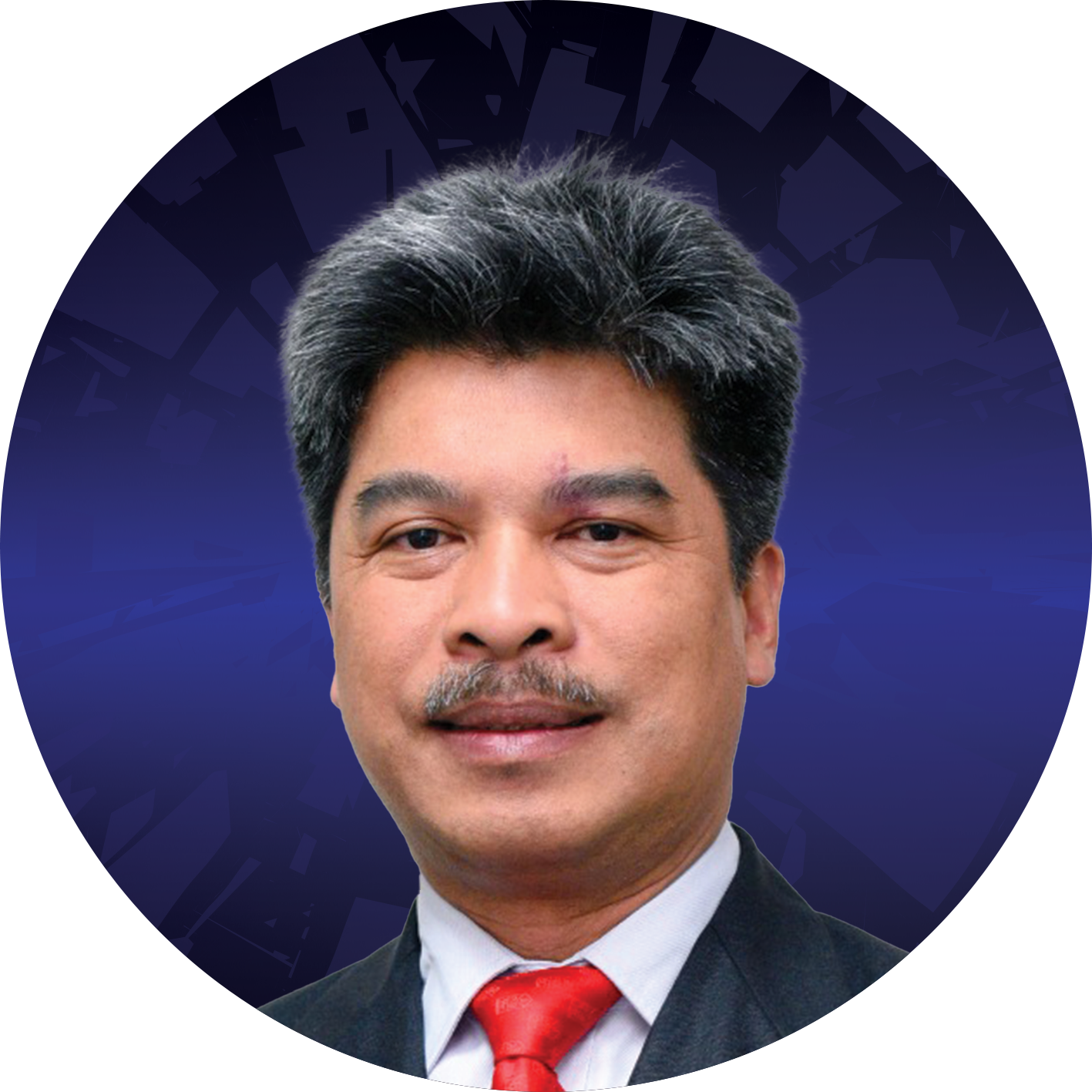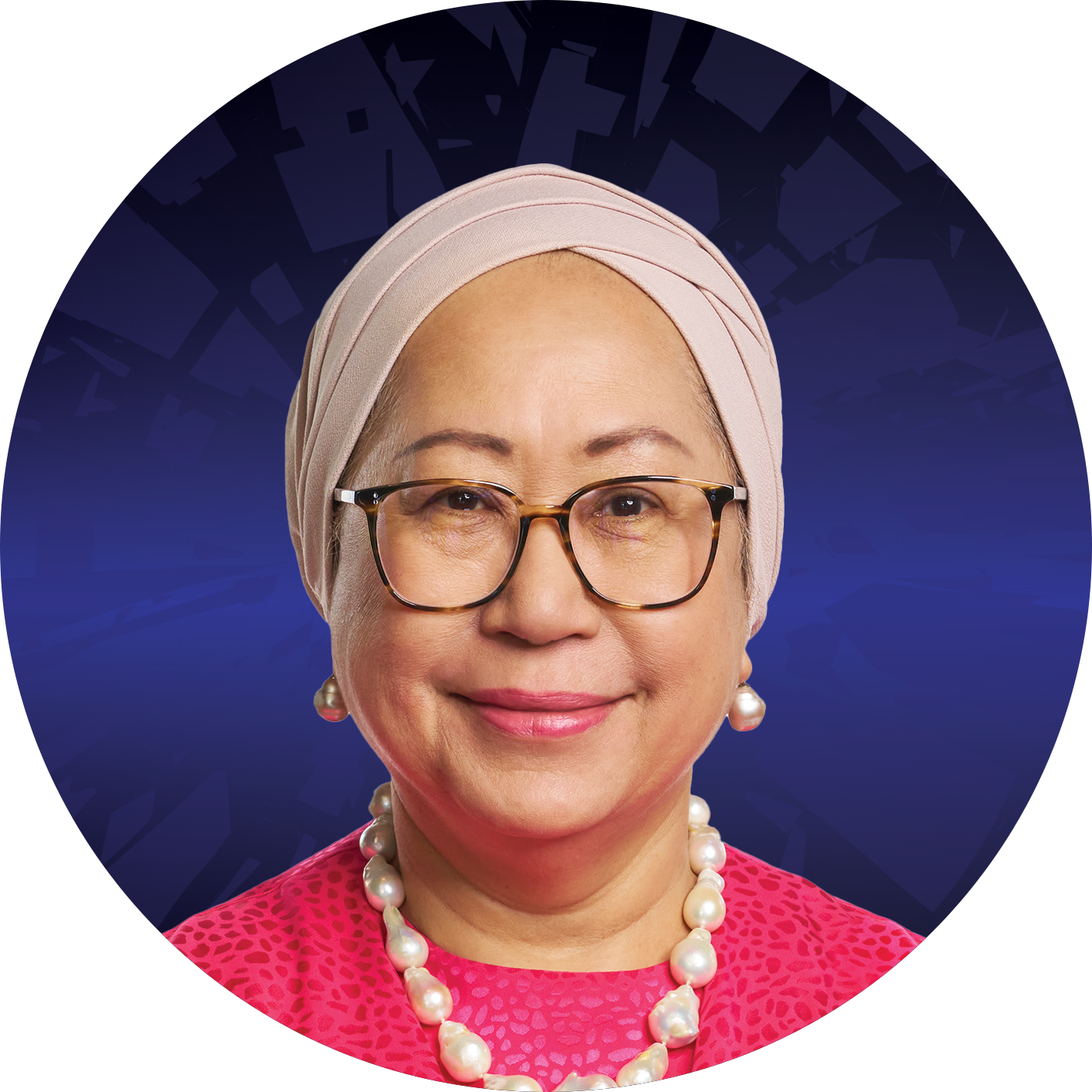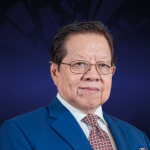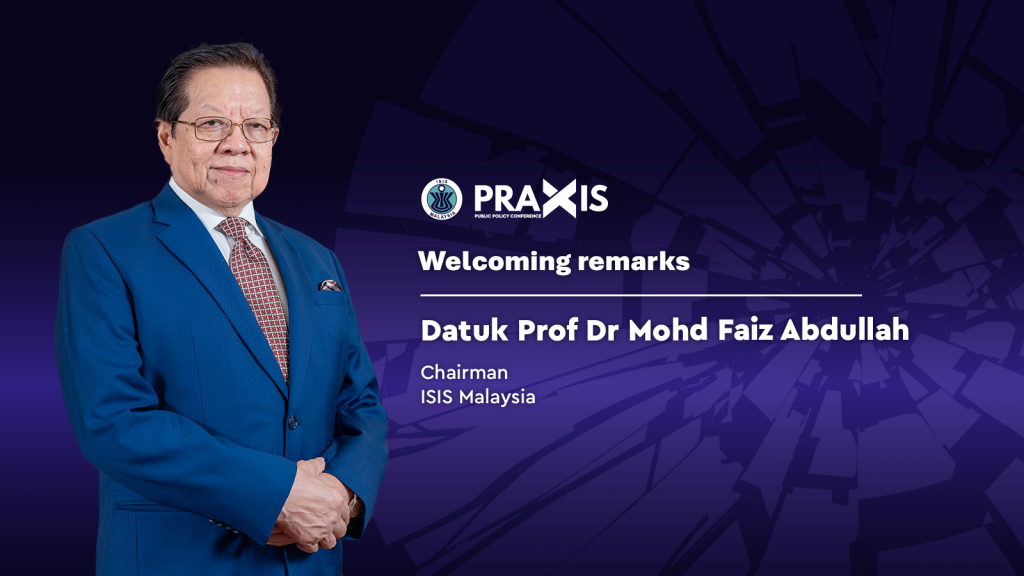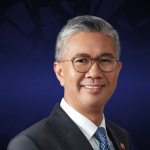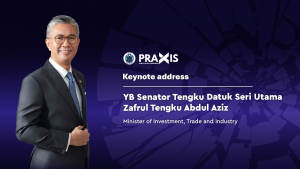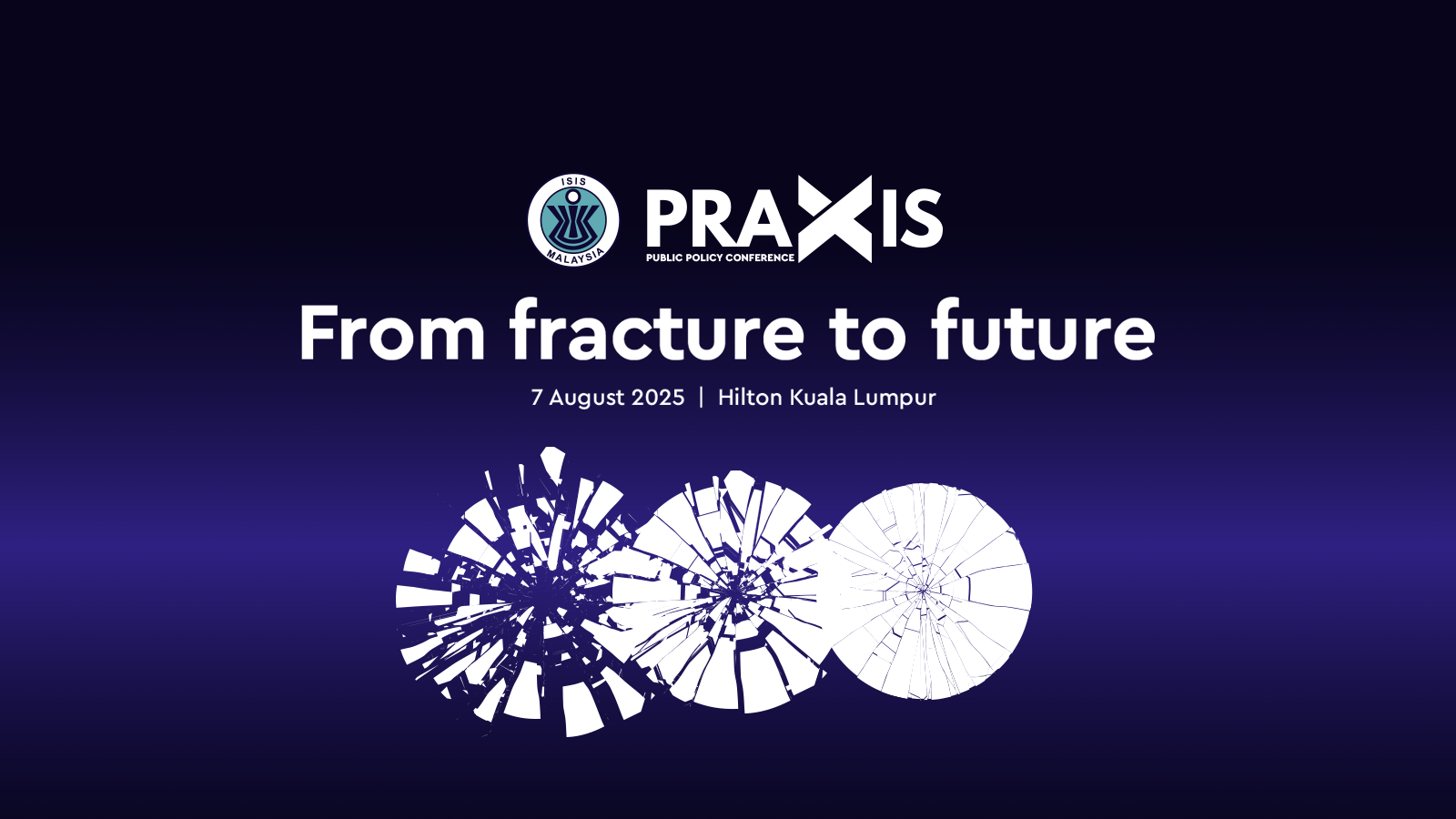
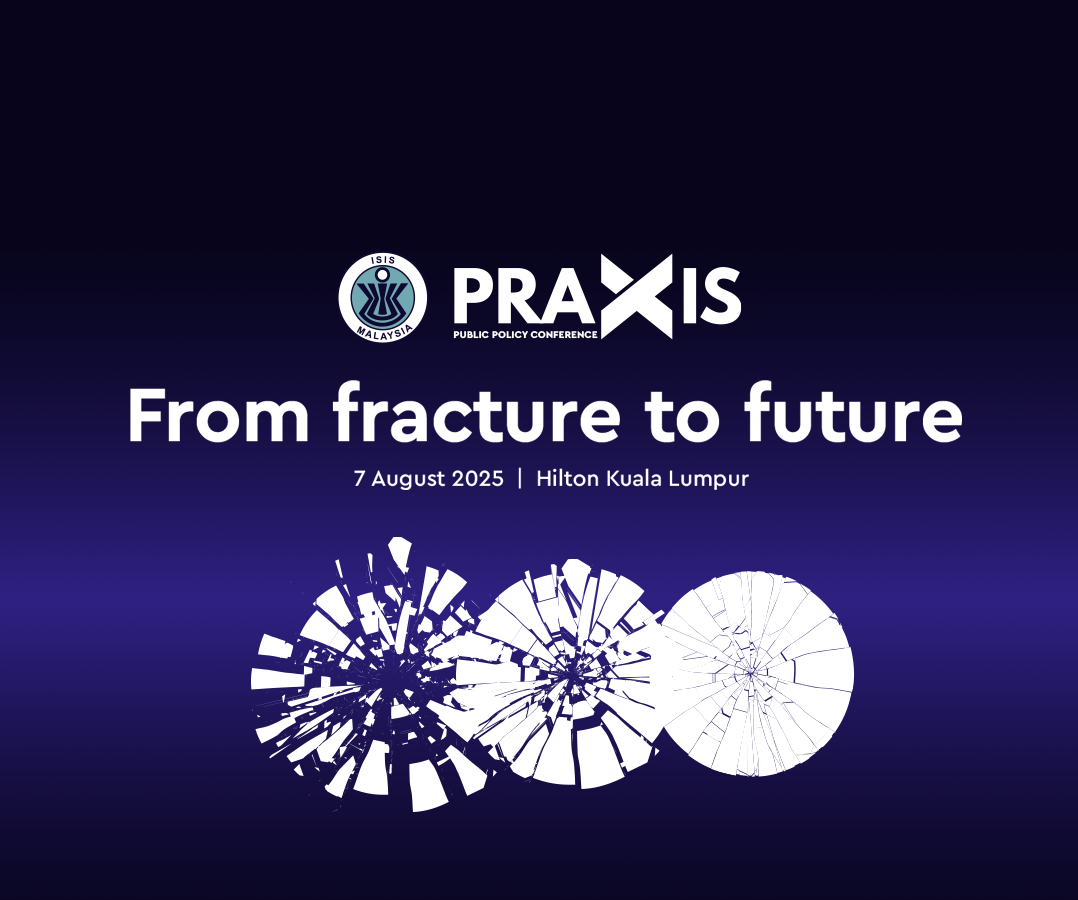
About PRAXIS 2025
The global order is coming apart at the seams.
Trade barriers worldwide are climbing to heights unseen in modern history, all while the multilateral rules-based trading system remains defective. Hard-won climate commitments achieved over decades are backsliding, while increasing global fragmentation threatens the foundations of Malaysia’s economic development. As familiar international frameworks dissolve, the world grows more fragmented, uncertain and dangerous.
Malaysia cannot afford to stand idle. This moment offers Malaysia the opportunity to shape the next generation of regional norms around trade, climate and connectivity – and to strengthen our economic and physical ties across ASEAN and beyond.
Join us at PRAXIS 2025 to explore what comes after the old normal – and how Malaysia could shape today’s global fractures into its future advantage.
Speakers
Keynote address
Fireside chat
Keynote address
Fireside chat
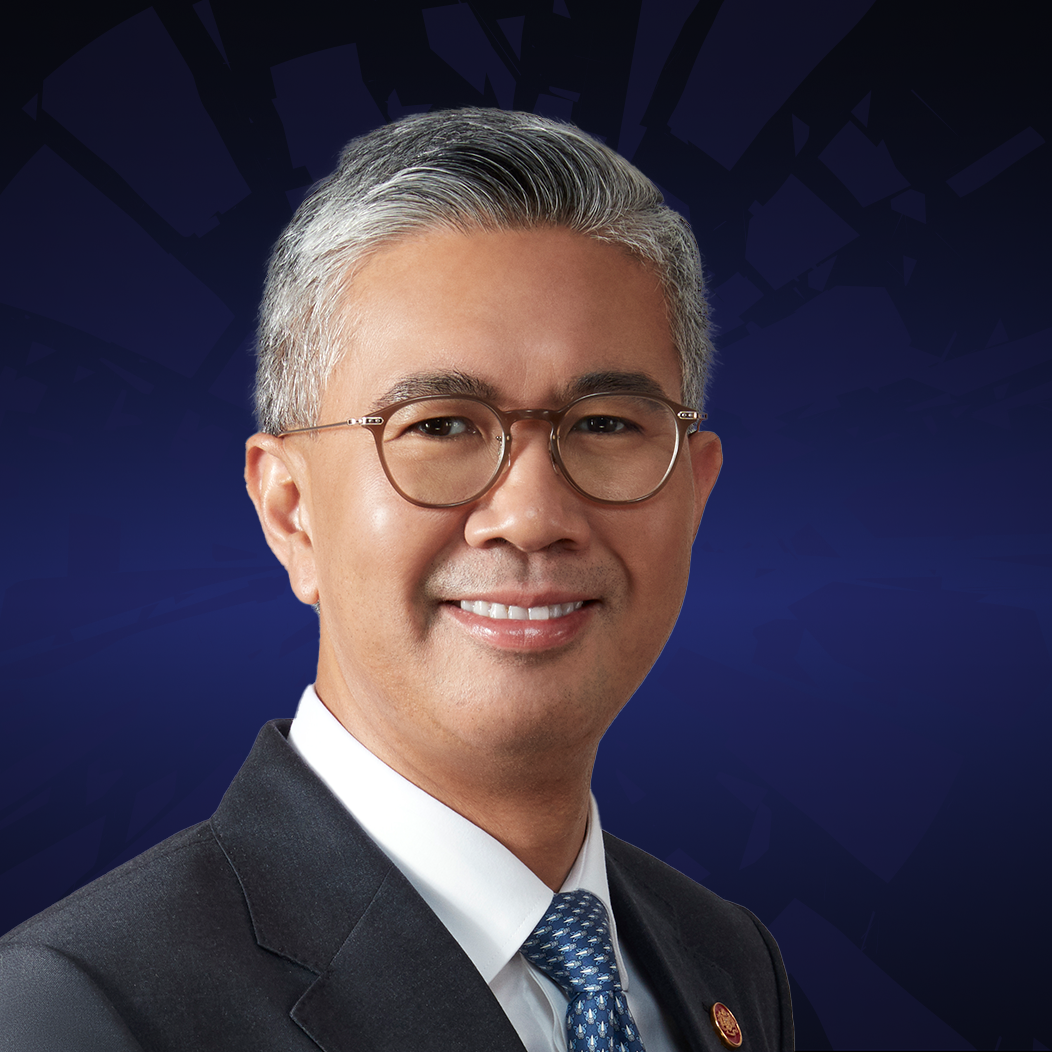
YB Senator Tengku Datuk Seri Utama Zafrul Tengku Abdul Aziz
Minister of Investment, Trade and IndustryTengku Zafrul is responsible for growing the manufacturing industry and trade, as well as attracting investments into the country. He was in banking for more than 25 years and was the CEO of CIMB Group – a regional role in ASEAN – before being appointed Malaysia’s finance minister during the pandemic. In his current role, he spearheaded the formulation of various key industrial policies, including Malaysia’s New Industrial Master Plan 2030, Chemical Industry Roadmap 2030, National Semiconductor Strategy and Green Investment Strategy. During Malaysia’s ASEAN 2025 chairmanship, his ministry led the formulation of 18 priority economic deliverables to advance ASEAN’s economic integration by enhancing intra-ASEAN trade, strengthening economic relations with key trading partners and pushing for regional frameworks in areas such as electric vehicles and AI. Since April, he has also led tariff negotiations on Malaysian US-bound exports.

YB Tuan Steven Sim Chee Keong
Minister of Human ResourcesYB Sim is the Bukit Mertajam MP and was appointed to his current post in December 2023. He is a former deputy finance minister and deputy youth and sports minister. Prior to his election as member of parliament, Sim served as councillor in Majlis Bandaraya Seberang Perai, one of the largest municipal councils in the country. He also sits on the governing board of the Penang Institute, a leading public policy think-tank. He is the author of four books: The Audacity to Think: An Invitation to Rethink Politics; Being Malaysia; an anthology of Malay poems, Dalam Salju Ada Bunga (2018); and a contemporary sociopolitical critique of the Malay classic Hikayat Hang Tuah, Hang Tuah: Adiwira Bangsa. In 201, he was named a Young Global Leader of the Geneva-based World Economic Forum.
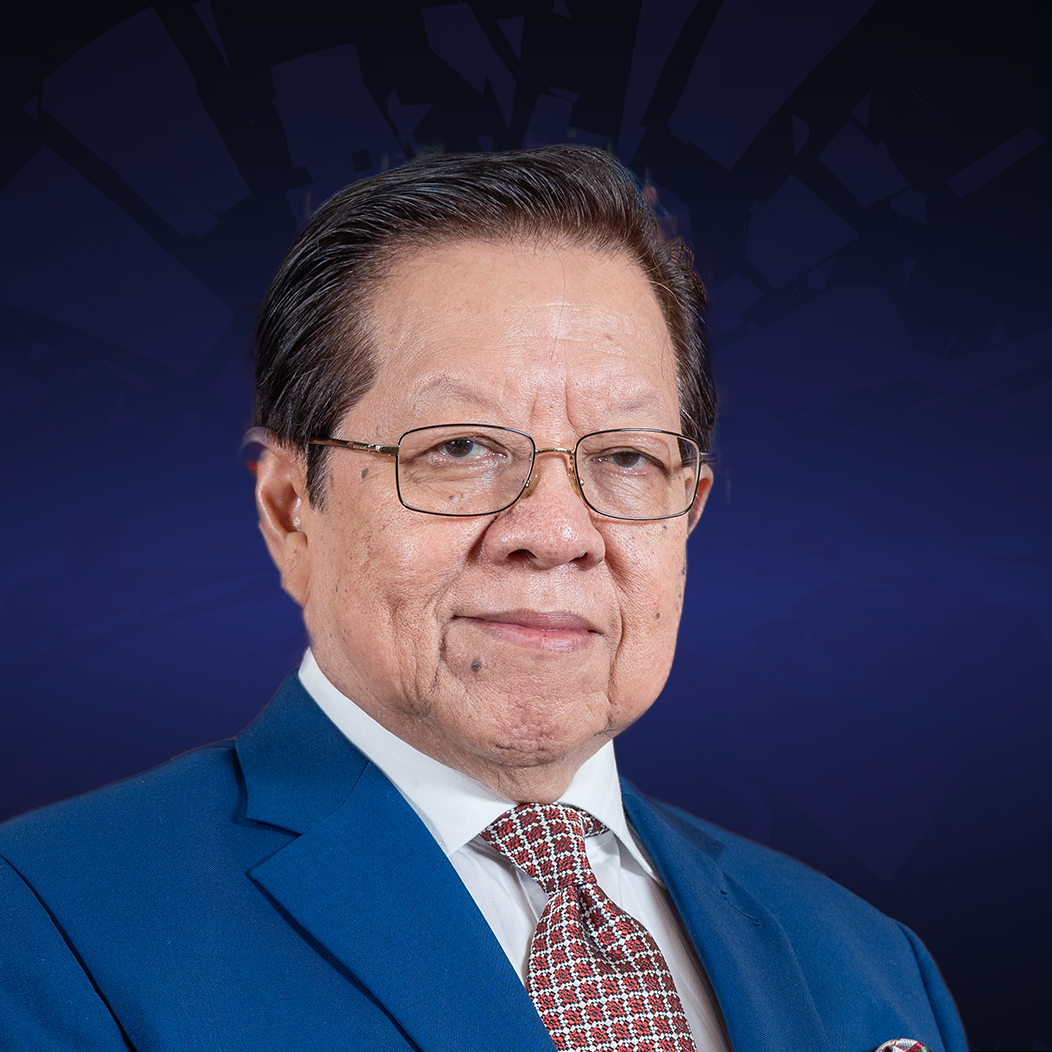
Datuk Prof Dr Mohd Faiz Abdullah
Chairman, Institute of Strategic & International Studies (ISIS) MalaysiaProf Faiz leads the institute’s policy development and Track 2 diplomacy, including through the ASEAN Institutes of Strategic and International Studies (ASEAN-ISIS) and Pacific Economic Cooperation Council (PECC). He is also the Malaysian representative to the ASEAN Regional Forum Experts and Eminent Persons (ARF EEP) meeting, Co-Chair of the Council for Security Cooperation in the Asia-Pacific (CSCAP) and a member of the World Economic Forum’s Global Future Council on Good Governance
Speakers
Moderator
Speakers

Arividya Arimuthu
Senior Fellow, Institute of Strategic & International Studies (ISIS) MalaysiaArividya is a senior fellow in the Chairman’s Office. She specialises in WTO and EU laws and has more than 20 years’ experience in trade negotiations. She is a former senior director for strategic negotiations at MITI and chief negotiator for numerous high-stakes free trade agreement negotiations, including CPTPP, for which she led the ratification and implementation for Malaysia.
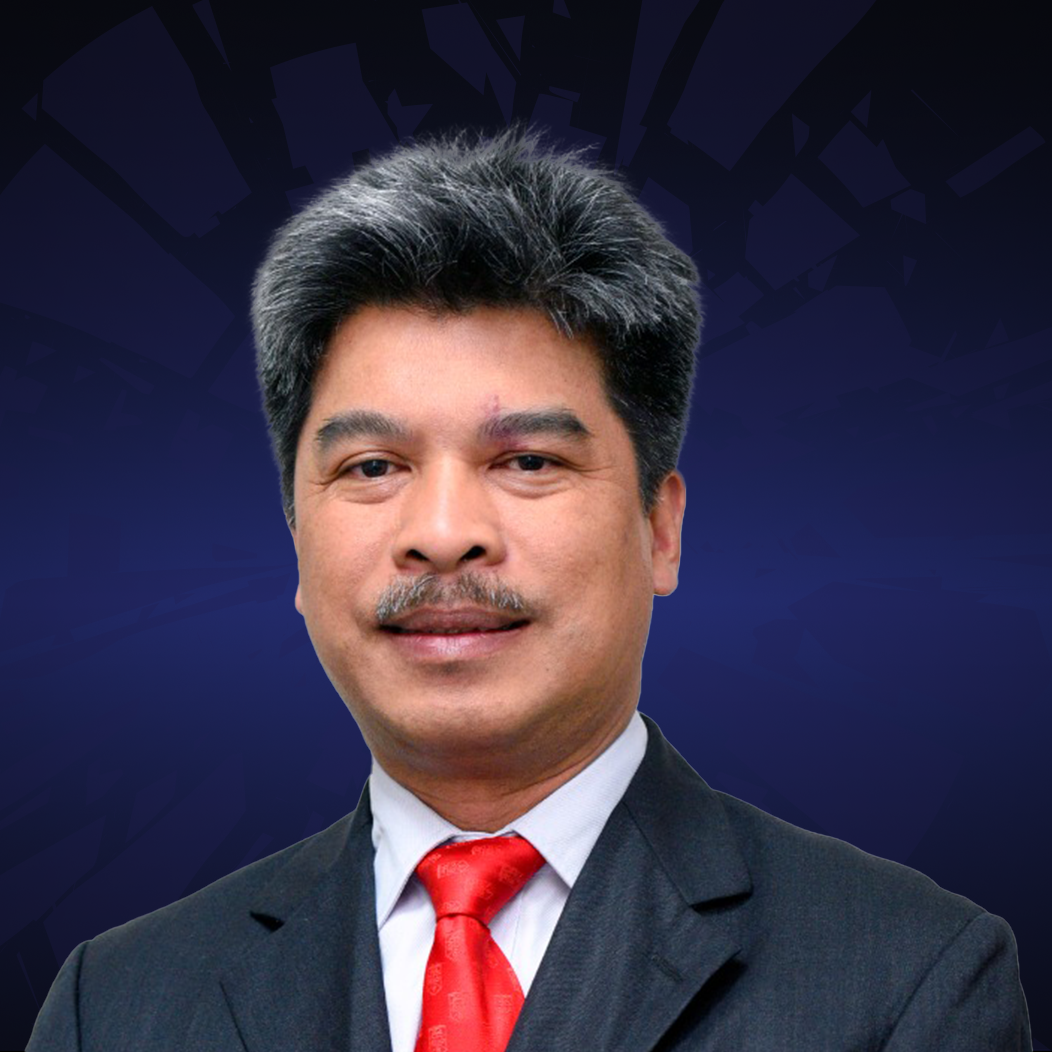
Prof Sufian Jusoh
Director, Institute of Malaysian and International Studies (IKMAS) , Universiti Kebangsaan MalaysiaDr Sufian is a professor of international trade and investment at IKMAS. He is an expert in international trade and investment, ASEAN and regional integration, and international development. He leads a team supporting the ASEAN chairmanship 2025, working on the ASEAN Vision 2045, ASEAN Economic Community Strategic Plan 2026-20230 and ASEAN Higher Education Declaration. He is a former delegate to the High-Level Task Force for ASEAN Community Vision Post-2025. He also played a key role in the success of Malaysia’s chairmanship of APEC 2020, leading to the APEC Putrajaya Vision 2040.

Datin Lorela Chia
Founding President, Malaysia Association of Sustainable Supply Chain & InnovationDatin Chia is vice-president I of the Machinery & Engineering Industries Federation. Her work bridges industrialisation, sustainability and social impact drawn from nearly three decades of experience in B2B trade, cross-border expansion and ecosystem development. She has led engagements across ASEAN, South Asia, Africa and Latin America, with a portfolio that spans supply chain resilience, inclusive innovation, and sectoral transformation across engineering, fashion, halal, intellectual property and special-needs accessibility.

HE Dato’ Astanah Abdul Aziz
Deputy Secretary-General of ASEAN, ASEAN SecretariatDato’ Astanah supports the ASEAN Secretary-General in developing and maintaining cooperation in political and security matters with member states, dialogue partners, and international and regional organisations. She leads the ASEAN Political-Security Community Department at the ASEAN Secretariat and provides leadership in the implementation of the APSC Blueprint 2025 and its successor document, the APSC Strategic Plan of the ASEAN Community Vision 2045. She has served in various capacities at the Ministry of Foreign Affairs of Malaysia, including as ambassador as well as representative at the Permanent Mission of Malaysia to the United Nations, New York.

Kieran Li Nair
Senior Researcher, ISIS MalaysiaKieran’s research interests lie in international relations and climate justice. She acted as a Malaysian youth representative to the 28th and 29th Conference of Parties. Beyond her professional experience, she has extensive involvement in civil society advocacy, most crucially with the Malaysian Youth Delegation and Malaysian CSO-SDG Alliance.
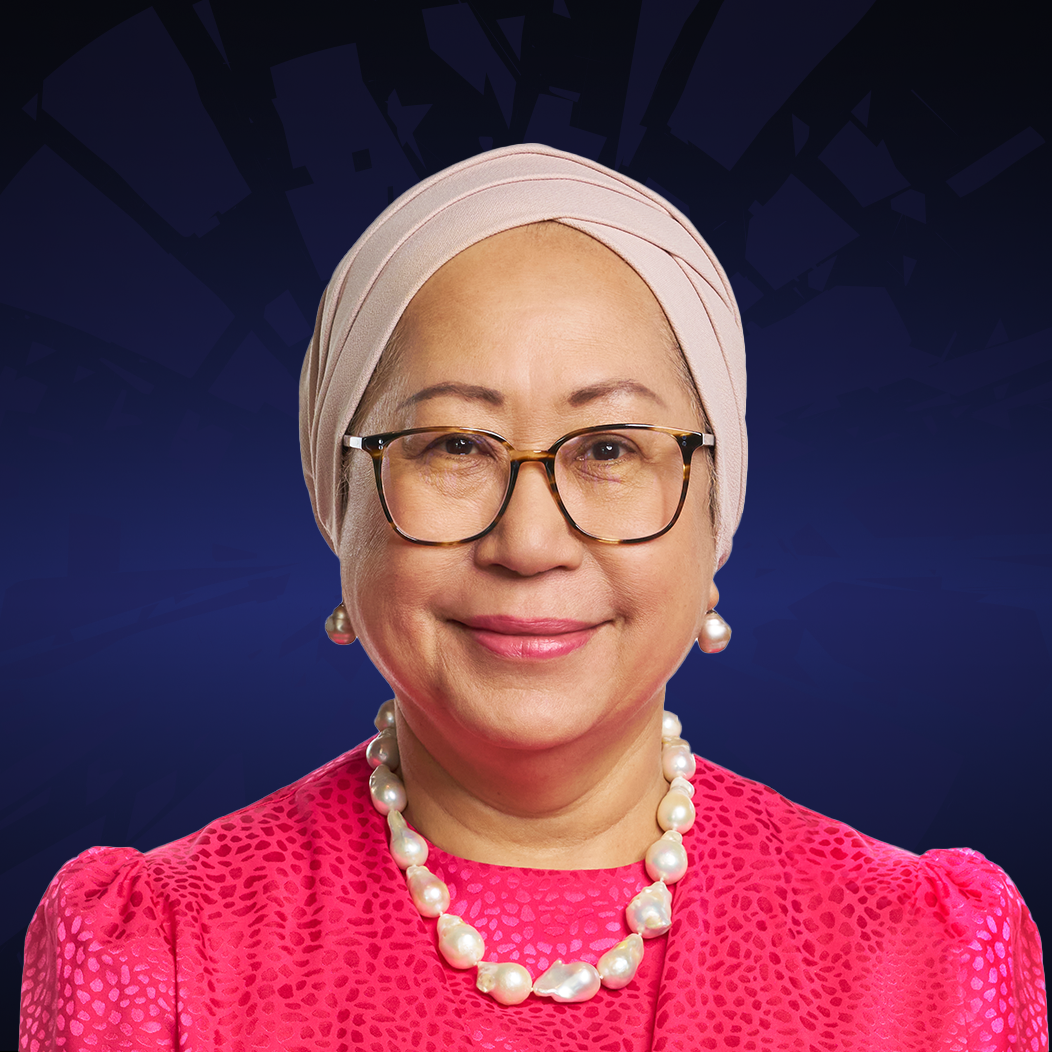
Tan Sri Prof Dr Jemilah Mahmood
Executive Director, Sunway Centre for Planetary Health, Sunway UniversityProf Jemilah has more than two decades’ experience managing crises in health, disasters and conflict settings. She holds advisory council roles in the government on climate and higher education. She is also an adjunct professor at Universiti Malaya, sustainability adviser at AirAsia and national adviser to the Malaysian Red Crescent Society. She sits on the boards of Roche in Switzerland and Norwegian Refugee Council. She currently co-chairs the World Economic Forum Steering Committee on Climate and Health and is a board member of the Global Future Council for Clean Air.
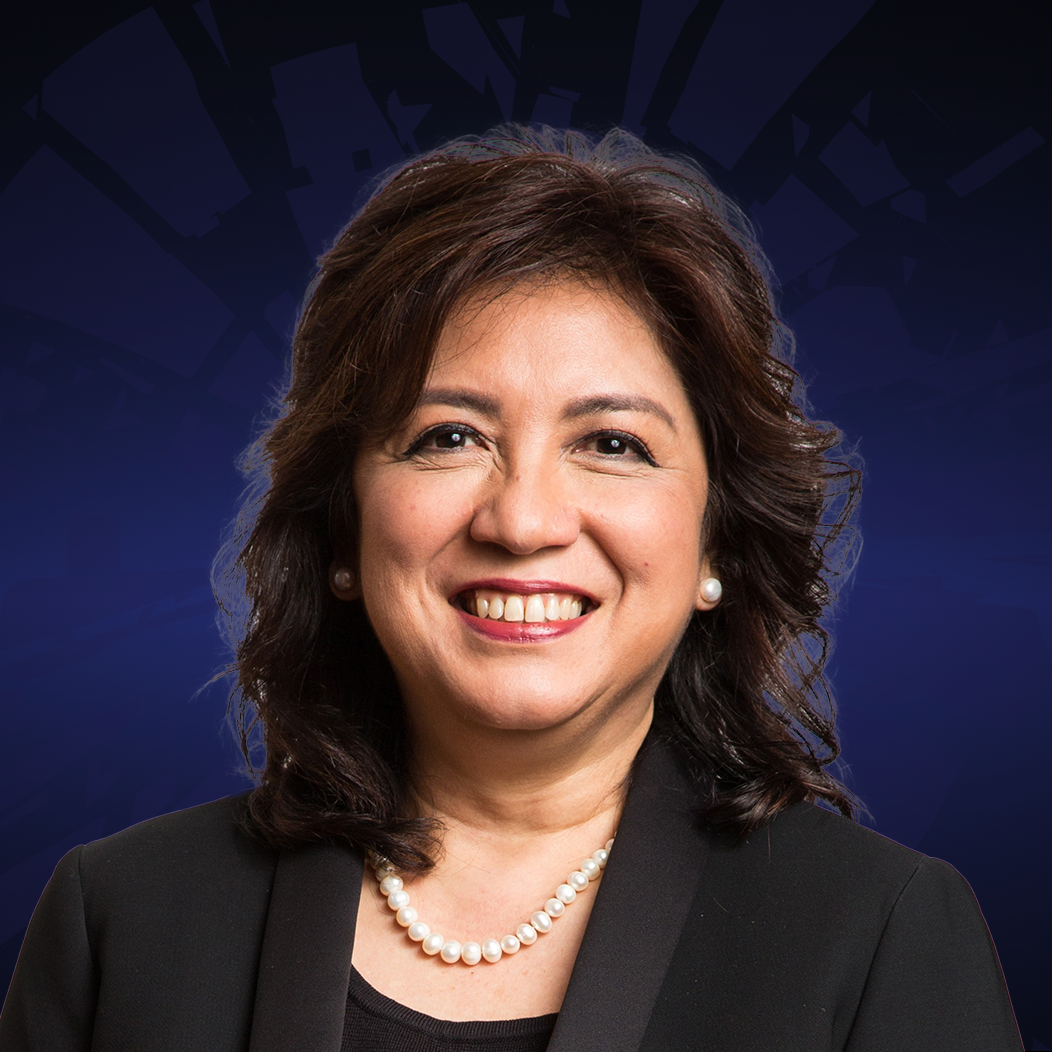
Prof Mely Caballero-Anthony
Head of Centre for Non-Traditional Security Studies, S.Rajaratnam School of International Studies (RSIS), SingaporeProf Caballero-Anthony holds the president’s chair for international relations and security studies. She heads the Centre for Non-Traditional Security Studies and is also an associate dean at Nanyang Technological University. She has published extensively in peer-reviewed journals and led research projects on international security and global governance. Her latest publications include Dual-Use Research of Concern Landscape in Southeast Asia: Prioritisation, Gaps and Challenges; Climate Security in Southeast Asia: Navigating Concepts, Approaches and Practices; Human Security and Empowerment in Asia; and Conflict Management and Atrocity Prevention in Southeast Asia: making ASEAN ‘Fit for Purpose’.

Tomokazu Serizawa
Programme Specialist, United Nations Development Programme (UNDP) Bangkok, ThailandSerizawa is a specialist in climate and security risks and plays a leading role in the implementation of UNDP’s Climate, Peace and Security offer for Asia-Pacific. He provides technical support on climate, peace and security to member states, international and regional organisations, the research community and civil society. He has extensive experience in conflict and post-conflict settings with the thematic topics of peacebuilding, disarmament, demobilisation and reintegration of ex-combatants, small arms control, stabilisation, prevention of violent extremism, among others.

Tan Sri Dr Rebecca Sta Maria
Director, Institute for Democracy and Economic Affairs (IDEAS) MalaysiaTan Sri Rebecca is the pro chancellor of Sunway University. She is the former secretary-general of the Ministry of International Trade and Industry and executive director of the APEC Secretariat based in Singapore. She chaired the body that drafted the 2015 and 2025 ASEAN Economic Community Blueprints. In 2024, she was featured in Forbes’ third annual 50 Over 50: Asia list, which showcases 50 inspirational women over the age of 50 from across the Asia-Pacific region.

Datuk Syed Mohamed Syed Ibrahim
President & Chief Executive, Johor CorporationDatuk Syed Mohamed was appointed to the current post in January 2020. With more than 30 years’ experience spanning banking, property, investment and development, he has held senior leadership roles at Sime Darby Land, Encorp Bhd, TH Properties and Iskandar Investment Bhd. He expanded his international portfolio as COO of Knowledge Economic City in Madinah, Saudi Arabia. He is currently serving as chairman of Kulim (Malaysia) Bhd, JLand Group, Waqaf An-Nur, KPJ Healthcare University and Malaysia Steel Works. He also sits on the boards of Yayasan Sultan Ibrahim, Yayasan Kanser Tunku Laksamana Johor, Johor Centre for Sustainability and Johor Darul Ta’zim Football Club. He holds adjunct professorships at the Faculty of Built Environment & Surveying at Universiti Teknologi Malaysia and School of Government at Universiti Utara Malaysia.

Dr Fauziah Zen
Senior Economist, Economic Research Institute for ASEAN and East Asia (ERIA), IndonesiaDr Fauziah has more than 17 years’ expertise in public finance, regulatory impact assessment, infrastructure development and climate financing. She is also a faculty member at the Faculty of Economics and Business, University of Indonesia and visiting professor at Hitotsubashi University in Japan. She has had held several roles in economic policy and research, including serving as deputy head at Indonesia National Research Council, adviser to the finance minister on fiscal decentralisation and as chief economist of Nusantara Capital City.

Dr Francis Hutchinson
Senior Fellow , ISEAS-Yusof Ishak Institute SingaporeDr Hutchinson co-ordinates the Malaysia Studies Programme at the ISEAS-Yusof Ishak Institute. His research interests include state-business relations, elections, federalism, decentralisation, local economic development and cross-border regions. He is the managing editor of the Journal of Southeast Asian Economies and has authored or edited nine books, including: Mirror Images in Different Frames? Johor, the Riau Islands and Competition for Investment from Singapore; Asia and the Middle-Income Trap; and The SIJORI Series – a trilogy that explores and analyses linkages between Singapore, Johor and the Riau Islands.
Keynote address

YB Senator Tengku Datuk Seri Utama Zafrul Tengku Abdul Aziz
Minister of Investment, Trade and IndustryTengku Zafrul is responsible for growing the manufacturing industry and trade, as well as attracting investments into the country. He was in banking for more than 25 years and was the CEO of CIMB Group – a regional role in ASEAN – before being appointed Malaysia’s finance minister during the pandemic. In his current role, he spearheaded the formulation of various key industrial policies, including Malaysia’s New Industrial Master Plan 2030, Chemical Industry Roadmap 2030, National Semiconductor Strategy and Green Investment Strategy. During Malaysia’s ASEAN 2025 chairmanship, his ministry led the formulation of 18 priority economic deliverables to advance ASEAN’s economic integration by enhancing intra-ASEAN trade, strengthening economic relations with key trading partners and pushing for regional frameworks in areas such as electric vehicles and AI. Since April, he has also led tariff negotiations on Malaysian US-bound exports.
Fireside chat

YB Tuan Steven Sim Chee Keong
Minister of Human ResourcesYB Sim is the Bukit Mertajam MP and was appointed to his current post in December 2023. He is a former deputy finance minister and deputy youth and sports minister. Prior to his election as member of parliament, Sim served as councillor in Majlis Bandaraya Seberang Perai, one of the largest municipal councils in the country. He also sits on the governing board of the Penang Institute, a leading public policy think-tank. He is the author of four books: The Audacity to Think: An Invitation to Rethink Politics; Being Malaysia; an anthology of Malay poems, Dalam Salju Ada Bunga (2018); and a contemporary sociopolitical critique of the Malay classic Hikayat Hang Tuah, Hang Tuah: Adiwira Bangsa. In 201, he was named a Young Global Leader of the Geneva-based World Economic Forum.

Datuk Prof Dr Mohd Faiz Abdullah
Chairman, Institute of Strategic & International Studies (ISIS) MalaysiaProf Faiz leads the institute’s policy development and Track 2 diplomacy, including through the ASEAN Institutes of Strategic and International Studies (ASEAN-ISIS) and Pacific Economic Cooperation Council (PECC). He is also the Malaysian representative to the ASEAN Regional Forum Experts and Eminent Persons (ARF EEP) meeting, Co-Chair of the Council for Security Cooperation in the Asia-Pacific (CSCAP) and a member of the World Economic Forum’s Global Future Council on Good Governance
Speakers

Arividya Arimuthu
Senior Fellow, Institute of Strategic & International Studies (ISIS) MalaysiaArividya is a senior fellow in the Chairman’s Office. She specialises in WTO and EU laws and has more than 20 years’ experience in trade negotiations. She is a former senior director for strategic negotiations at MITI and chief negotiator for numerous high-stakes free trade agreement negotiations, including CPTPP, for which she led the ratification and implementation for Malaysia.

Prof Sufian Jusoh
Director, Institute of Malaysian and International Studies (IKMAS) , Universiti Kebangsaan MalaysiaDr Sufian is a professor of international trade and investment at IKMAS. He is an expert in international trade and investment, ASEAN and regional integration, and international development. He leads a team supporting the ASEAN chairmanship 2025, working on the ASEAN Vision 2045, ASEAN Economic Community Strategic Plan 2026-20230 and ASEAN Higher Education Declaration. He is a former delegate to the High-Level Task Force for ASEAN Community Vision Post-2025. He also played a key role in the success of Malaysia’s chairmanship of APEC 2020, leading to the APEC Putrajaya Vision 2040.

Datin Lorela Chia
Founding President, Malaysia Association of Sustainable Supply Chain & InnovationDatin Chia is vice-president I of the Machinery & Engineering Industries Federation. Her work bridges industrialisation, sustainability and social impact drawn from nearly three decades of experience in B2B trade, cross-border expansion and ecosystem development. She has led engagements across ASEAN, South Asia, Africa and Latin America, with a portfolio that spans supply chain resilience, inclusive innovation, and sectoral transformation across engineering, fashion, halal, intellectual property and special-needs accessibility.

HE Dato’ Astanah Abdul Aziz
Deputy Secretary-General of ASEAN, ASEAN SecretariatDato’ Astanah supports the ASEAN Secretary-General in developing and maintaining cooperation in political and security matters with member states, dialogue partners, and international and regional organisations. She leads the ASEAN Political-Security Community Department at the ASEAN Secretariat and provides leadership in the implementation of the APSC Blueprint 2025 and its successor document, the APSC Strategic Plan of the ASEAN Community Vision 2045. She has served in various capacities at the Ministry of Foreign Affairs of Malaysia, including as ambassador as well as representative at the Permanent Mission of Malaysia to the United Nations, New York.

Kieran Li Nair
Senior Researcher, ISIS MalaysiaKieran’s research interests lie in international relations and climate justice. She acted as a Malaysian youth representative to the 28th and 29th Conference of Parties. Beyond her professional experience, she has extensive involvement in civil society advocacy, most crucially with the Malaysian Youth Delegation and Malaysian CSO-SDG Alliance.

Tan Sri Prof Dr Jemilah Mahmood
Executive Director, Sunway Centre for Planetary Health, Sunway UniversityProf Jemilah has more than two decades’ experience managing crises in health, disasters and conflict settings. She holds advisory council roles in the government on climate and higher education. She is also an adjunct professor at Universiti Malaya, sustainability adviser at AirAsia and national adviser to the Malaysian Red Crescent Society. She sits on the boards of Roche in Switzerland and Norwegian Refugee Council. She currently co-chairs the World Economic Forum Steering Committee on Climate and Health and is a board member of the Global Future Council for Clean Air.

Prof Mely Caballero-Anthony
Head of Centre for Non-Traditional Security Studies, S.Rajaratnam School of International Studies (RSIS), SingaporeProf Caballero-Anthony holds the president’s chair for international relations and security studies. She heads the Centre for Non-Traditional Security Studies and is also an associate dean at Nanyang Technological University. She has published extensively in peer-reviewed journals and led research projects on international security and global governance. Her latest publications include Dual-Use Research of Concern Landscape in Southeast Asia: Prioritisation, Gaps and Challenges; Climate Security in Southeast Asia: Navigating Concepts, Approaches and Practices; Human Security and Empowerment in Asia; and Conflict Management and Atrocity Prevention in Southeast Asia: making ASEAN ‘Fit for Purpose’.

Tomokazu Serizawa
Programme Specialist, United Nations Development Programme (UNDP) Bangkok, ThailandSerizawa is a specialist in climate and security risks and plays a leading role in the implementation of UNDP’s Climate, Peace and Security offer for Asia-Pacific. He provides technical support on climate, peace and security to member states, international and regional organisations, the research community and civil society. He has extensive experience in conflict and post-conflict settings with the thematic topics of peacebuilding, disarmament, demobilisation and reintegration of ex-combatants, small arms control, stabilisation, prevention of violent extremism, among others.

Tan Sri Dr Rebecca Sta Maria
Director, Institute for Democracy and Economic Affairs (IDEAS) MalaysiaTan Sri Rebecca is the pro chancellor of Sunway University. She is the former secretary-general of the Ministry of International Trade and Industry and executive director of the APEC Secretariat based in Singapore. She chaired the body that drafted the 2015 and 2025 ASEAN Economic Community Blueprints. In 2024, she was featured in Forbes’ third annual 50 Over 50: Asia list, which showcases 50 inspirational women over the age of 50 from across the Asia-Pacific region.

Datuk Syed Mohamed Syed Ibrahim
President & Chief Executive, Johor CorporationDatuk Syed Mohamed assumed his present position on 9 January 2020. He began his career at Bank Bumiputera Bhd and Bank Rakyat before joining the Johor State Economic Development Corporation, the predecessor of Johor Corporation. He has had key roles at Sime Darby Land and Encorp Bhd and leading the transformation of TH Properties Sdn Bhd’s flagship project, Bandar Enstek. He is the former COO of Knowledge Economic City in Madina, Saudi Arabia; president and CEO of Iskandar Investment Bhd; and chairman of Felda Investment Corporation Bhd. He is currently serving as chairman of Kulim Berhad, JLand Group Sdn Bhd, Waqaf An-Nur Corporation Berhad, KPJ Healthcare University and non-executive chairman of Malaysia Steel Works (KL) Bhd. He is also as an adjunct professor at the Faculty of Built Environment and Surveying, Universiti Teknologi Malaysia, and School of Government, Universiti Utara Malaysia.

Dr Fauziah Zen
Senior Economist, Economic Research Institute for ASEAN and East Asia (ERIA), IndonesiaDr Fauziah has more than 17 years’ expertise in public finance, regulatory impact assessment, infrastructure development and climate financing. She is also a faculty member at the Faculty of Economics and Business, University of Indonesia and visiting professor at Hitotsubashi University in Japan. She has had held several roles in economic policy and research, including serving as deputy head at Indonesia National Research Council, adviser to the finance minister on fiscal decentralisation and as chief economist of Nusantara Capital City.

Dr Francis Hutchinson
Senior Fellow , ISEAS-Yusof Ishak Institute SingaporeDr Hutchinson co-ordinates the Malaysia Studies Programme at the ISEAS-Yusof Ishak Institute. His research interests include state-business relations, elections, federalism, decentralisation, local economic development and cross-border regions. He is the managing editor of the Journal of Southeast Asian Economies and has authored or edited nine books, including: Mirror Images in Different Frames? Johor, the Riau Islands and Competition for Investment from Singapore; Asia and the Middle-Income Trap; and The SIJORI Series – a trilogy that explores and analyses linkages between Singapore, Johor and the Riau Islands.
Thursday, 7 August 2025
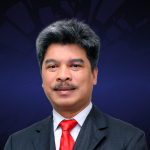



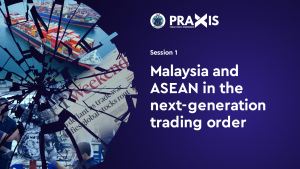 As the current global trade order fractures under the weight of geopolitical tensions, Malaysia faces large risks but even larger choices. It is self-evident that Malaysia must recalibrate swiftly trade policies, diversify markets and safeguard strategic economic sectors, using this moment to reshape global and regional trade rules. Yet, efforts to deepen intra-ASEAN trade, present a unified front on tariffs and foster regional supply chain integration have come up against the gravity of competing domestic interests and rising resource nationalism. This session explores how external pressures, including shifting trade flows and new economic alignments, are reshaping Malaysia. What practical measures has Malaysia taken thus far and how effective are they? Given divergent interests within ASEAN and broader global uncertainty, what forms of regional cooperation remain viable for Malaysia? Crucially, what strategic policy levers can Malaysia use to shape the next-generation trading order in line with its long-term economic interests and national identity?
As the current global trade order fractures under the weight of geopolitical tensions, Malaysia faces large risks but even larger choices. It is self-evident that Malaysia must recalibrate swiftly trade policies, diversify markets and safeguard strategic economic sectors, using this moment to reshape global and regional trade rules. Yet, efforts to deepen intra-ASEAN trade, present a unified front on tariffs and foster regional supply chain integration have come up against the gravity of competing domestic interests and rising resource nationalism. This session explores how external pressures, including shifting trade flows and new economic alignments, are reshaping Malaysia. What practical measures has Malaysia taken thus far and how effective are they? Given divergent interests within ASEAN and broader global uncertainty, what forms of regional cooperation remain viable for Malaysia? Crucially, what strategic policy levers can Malaysia use to shape the next-generation trading order in line with its long-term economic interests and national identity?
Moderator:
Arividya Arimuthu
Senior Fellow
ISIS Malaysia
Speakers:
Prof Dr Sufian Jusoh
Professor of International Trade and Investment
Universiti Kebangsaan Malaysia
Datin Lorela Chia
Founding President
Malaysia Association of Sustainable Supply Chains
H.E. Dato’ Astanah Abdul Aziz
Deputy Secretary-General of ASEAN
ASEAN Secretariat




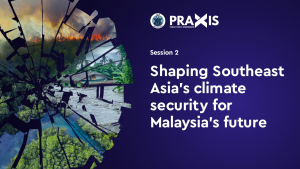 Climate change is a threat multiplier that magnifies Southeast Asia’s existing vulnerabilities. Heat extremes, pluvial floods and sea-level rise create new systemic risks for food systems, critical infrastructure and financial stability. Yet, decades of global climate cooperation are unravelling under geopolitical rivalry, leaving high-risk regions like ASEAN without a unified response. This moment gives Malaysia both a strategic imperative and diplomatic opening to champion a self-reliant, region-wide climate agenda that converts today’s fractures into future strength. This session will explore resilience-building strategies in addressing climate impacts. What are some immediate domestic and cross-border hot spots that demand immediate intervention from Malaysia and ASEAN? How would Southeast Asia’s regional differences account for climate risks? How can Malaysia build partnerships to anchor a next-generation ASEAN climate security agenda while advancing its own low-carbon, climate-resilient future?
Climate change is a threat multiplier that magnifies Southeast Asia’s existing vulnerabilities. Heat extremes, pluvial floods and sea-level rise create new systemic risks for food systems, critical infrastructure and financial stability. Yet, decades of global climate cooperation are unravelling under geopolitical rivalry, leaving high-risk regions like ASEAN without a unified response. This moment gives Malaysia both a strategic imperative and diplomatic opening to champion a self-reliant, region-wide climate agenda that converts today’s fractures into future strength. This session will explore resilience-building strategies in addressing climate impacts. What are some immediate domestic and cross-border hot spots that demand immediate intervention from Malaysia and ASEAN? How would Southeast Asia’s regional differences account for climate risks? How can Malaysia build partnerships to anchor a next-generation ASEAN climate security agenda while advancing its own low-carbon, climate-resilient future?
Moderator:
Kieran Li Nair
Senior Researcher
ISIS Malaysia
Speakers:
Tan Sri Prof Dr Jemilah Mahmood
Executive Director
Sunway Centre for Planetary Health (SCPH)
Prof Mely Caballero-Anthony
Head of the Centre for Non-Traditional Security (NTS) Studies
S. Rajaratnam School of International Studies (RSIS)
Mr Tomokazu Serizawa
Programme Specialist
United Nations Development Programme

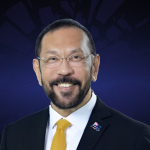


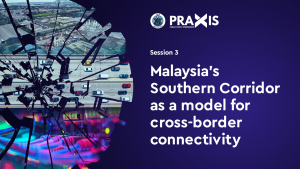 Major rail infrastructure investments, a surge of data centre developments, and initiatives such as the Johor–Singapore Special Economic Zone (JS-SEZ) are rapidly transforming Malaysia’s Southern Corridor into a nexus for cross-border integration. Amid a wider rollback of globalisation and rising fragmentation, Malaysia now has an opportunity to both advance and shape the next generation of regional connectivity norms – with the Southern Corridor serving as a living blueprint for how ASEAN countries can deepen regional integration and connectivity across borders. This session explores how Malaysia can use the Southern Corridor to set regional standards in infrastructure interoperability, economic cooperation, and cross-border flows of capital, talent, and services. What types of physical and digital infrastructure are necessary to unlock cross-border trade and attract investment? What incentives and policies will best attract and retain global talent and innovative firms to the region? Critically, how can Malaysia set the Southern Corridor within a broader ASEAN strategy for resilient, rules-based connectivity, offering a blueprint for economic integration in a fractured global order?
Major rail infrastructure investments, a surge of data centre developments, and initiatives such as the Johor–Singapore Special Economic Zone (JS-SEZ) are rapidly transforming Malaysia’s Southern Corridor into a nexus for cross-border integration. Amid a wider rollback of globalisation and rising fragmentation, Malaysia now has an opportunity to both advance and shape the next generation of regional connectivity norms – with the Southern Corridor serving as a living blueprint for how ASEAN countries can deepen regional integration and connectivity across borders. This session explores how Malaysia can use the Southern Corridor to set regional standards in infrastructure interoperability, economic cooperation, and cross-border flows of capital, talent, and services. What types of physical and digital infrastructure are necessary to unlock cross-border trade and attract investment? What incentives and policies will best attract and retain global talent and innovative firms to the region? Critically, how can Malaysia set the Southern Corridor within a broader ASEAN strategy for resilient, rules-based connectivity, offering a blueprint for economic integration in a fractured global order?
Moderator:
Tan Sri Datuk Dr Rebecca Fatima Sta Maria
Director
Institute for Democracy and Economic Affairs (IDEAS)
Speakers:
Datuk Syed Mohamed Syed Ibrahim
President & Chief Executive
Johor Corporation
Dr Fauziah Zen
Senior Economist
Economic Research Institute for ASEAN and East Asia (ERIA)
Dr Francis Hutchinson
Senior Fellow
ISEAS-Yusof Ishak Institute Singapore

Malaysia’s labour landscape is undergoing rapid transformation, driven by technological advances, demographic shifts, evolving migration patterns and ongoing labour market reforms. Human Resources Minister YB Steven Sim joins ISIS Malaysia Chairman Datuk Prof Faiz Abdullah for a candid fireside conversation on the nation’s future-of-work agenda. The session will explore key reforms since 2023, including wage improvements, enhanced worker protections and upskilling initiatives. It will also address pressing issues, such as gig worker legislation, migrant labour policies, progressive wage policies, AI-driven employment trends and the implications of the ASEAN Year of Skills 2025 on cross-border mobility. With a strong focus on inclusive and future-ready labour strategies, the discussion will highlight the minister’s top priorities for securing Malaysia’s workforce in the next global era.
Thursday, 7 August 2025




 As the current global trade order fractures under the weight of geopolitical tensions, Malaysia faces large risks but even larger choices. It is self-evident that Malaysia must recalibrate swiftly trade policies, diversify markets and safeguard strategic economic sectors, using this moment to reshape global and regional trade rules. Yet, efforts to deepen intra-ASEAN trade, present a unified front on tariffs and foster regional supply chain integration have come up against the gravity of competing domestic interests and rising resource nationalism. This session explores how external pressures, including shifting trade flows and new economic alignments, are reshaping Malaysia. What practical measures has Malaysia taken thus far and how effective are they? Given divergent interests within ASEAN and broader global uncertainty, what forms of regional cooperation remain viable for Malaysia? Crucially, what strategic policy levers can Malaysia use to shape the next-generation trading order in line with its long-term economic interests and national identity?
As the current global trade order fractures under the weight of geopolitical tensions, Malaysia faces large risks but even larger choices. It is self-evident that Malaysia must recalibrate swiftly trade policies, diversify markets and safeguard strategic economic sectors, using this moment to reshape global and regional trade rules. Yet, efforts to deepen intra-ASEAN trade, present a unified front on tariffs and foster regional supply chain integration have come up against the gravity of competing domestic interests and rising resource nationalism. This session explores how external pressures, including shifting trade flows and new economic alignments, are reshaping Malaysia. What practical measures has Malaysia taken thus far and how effective are they? Given divergent interests within ASEAN and broader global uncertainty, what forms of regional cooperation remain viable for Malaysia? Crucially, what strategic policy levers can Malaysia use to shape the next-generation trading order in line with its long-term economic interests and national identity?
Moderator:
Arividya Arimuthu
Senior Fellow
ISIS Malaysia
Speakers:
Prof Dr Sufian Jusoh
Professor of International Trade and Investment
Universiti Kebangsaan Malaysia
Datin Lorela Chia
Founding President
Malaysia Association of Sustainable Supply Chains
H.E. Dato’ Astanah Abdul Aziz
Deputy Secretary-General of ASEAN
ASEAN Secretariat




 Climate change is a threat multiplier that magnifies Southeast Asia’s existing vulnerabilities. Heat extremes, pluvial floods and sea-level rise create new systemic risks for food systems, critical infrastructure and financial stability. Yet, decades of global climate cooperation are unravelling under geopolitical rivalry, leaving high-risk regions like ASEAN without a unified response. This moment gives Malaysia both a strategic imperative and diplomatic opening to champion a self-reliant, region-wide climate agenda that converts today’s fractures into future strength. This session will explore resilience-building strategies in addressing climate impacts. What are some immediate domestic and cross-border hot spots that demand immediate intervention from Malaysia and ASEAN? How would Southeast Asia’s regional differences account for climate risks? How can Malaysia build partnerships to anchor a next-generation ASEAN climate security agenda while advancing its own low-carbon, climate-resilient future?
Climate change is a threat multiplier that magnifies Southeast Asia’s existing vulnerabilities. Heat extremes, pluvial floods and sea-level rise create new systemic risks for food systems, critical infrastructure and financial stability. Yet, decades of global climate cooperation are unravelling under geopolitical rivalry, leaving high-risk regions like ASEAN without a unified response. This moment gives Malaysia both a strategic imperative and diplomatic opening to champion a self-reliant, region-wide climate agenda that converts today’s fractures into future strength. This session will explore resilience-building strategies in addressing climate impacts. What are some immediate domestic and cross-border hot spots that demand immediate intervention from Malaysia and ASEAN? How would Southeast Asia’s regional differences account for climate risks? How can Malaysia build partnerships to anchor a next-generation ASEAN climate security agenda while advancing its own low-carbon, climate-resilient future?
Moderator:
Kieran Li Nair
Senior Researcher
ISIS Malaysia
Speakers:
Tan Sri Prof Dr Jemilah Mahmood
Executive Director
Sunway Centre for Planetary Health (SCPH)
Prof Mely Caballero-Anthony
Head of the Centre for Non-Traditional Security (NTS) Studies
S. Rajaratnam School of International Studies (RSIS)
Mr Tomokazu Serizawa
Programme Specialist
United Nations Development Programme




 Major rail infrastructure investments, a surge of data centre developments, and initiatives such as the Johor–Singapore Special Economic Zone (JS-SEZ) are rapidly transforming Malaysia’s Southern Corridor into a nexus for cross-border integration. Amid a wider rollback of globalisation and rising fragmentation, Malaysia now has an opportunity to both advance and shape the next generation of regional connectivity norms – with the Southern Corridor serving as a living blueprint for how ASEAN countries can deepen regional integration and connectivity across borders. This session explores how Malaysia can use the Southern Corridor to set regional standards in infrastructure interoperability, economic cooperation, and cross-border flows of capital, talent, and services. What types of physical and digital infrastructure are necessary to unlock cross-border trade and attract investment? What incentives and policies will best attract and retain global talent and innovative firms to the region? Critically, how can Malaysia set the Southern Corridor within a broader ASEAN strategy for resilient, rules-based connectivity, offering a blueprint for economic integration in a fractured global order?
Major rail infrastructure investments, a surge of data centre developments, and initiatives such as the Johor–Singapore Special Economic Zone (JS-SEZ) are rapidly transforming Malaysia’s Southern Corridor into a nexus for cross-border integration. Amid a wider rollback of globalisation and rising fragmentation, Malaysia now has an opportunity to both advance and shape the next generation of regional connectivity norms – with the Southern Corridor serving as a living blueprint for how ASEAN countries can deepen regional integration and connectivity across borders. This session explores how Malaysia can use the Southern Corridor to set regional standards in infrastructure interoperability, economic cooperation, and cross-border flows of capital, talent, and services. What types of physical and digital infrastructure are necessary to unlock cross-border trade and attract investment? What incentives and policies will best attract and retain global talent and innovative firms to the region? Critically, how can Malaysia set the Southern Corridor within a broader ASEAN strategy for resilient, rules-based connectivity, offering a blueprint for economic integration in a fractured global order?
Moderator:
Tan Sri Datuk Dr Rebecca Fatima Sta Maria
Director
Institute for Democracy and Economic Affairs (IDEAS)
Speakers:
Datuk Syed Mohamed Syed Ibrahim
President & Chief Executive
Johor Corporation
Dr Fauziah Zen
Senior Economist
Economic Research Institute for ASEAN and East Asia (ERIA)
Dr Francis Hutchinson
Senior Fellow
ISEAS-Yusof Ishak Institute Singapore

Malaysia’s labour landscape is undergoing rapid transformation, driven by technological advances, demographic shifts, evolving migration patterns and ongoing labour market reforms. Human Resources Minister YB Steven Sim joins ISIS Malaysia Chairman Datuk Prof Faiz Abdullah for a candid fireside conversation on the nation’s future-of-work agenda. The session will explore key reforms since 2023, including wage improvements, enhanced worker protections and upskilling initiatives. It will also address pressing issues, such as gig worker legislation, migrant labour policies, progressive wage policies, AI-driven employment trends and the implications of the ASEAN Year of Skills 2025 on cross-border mobility. With a strong focus on inclusive and future-ready labour strategies, the discussion will highlight the minister’s top priorities for securing Malaysia’s workforce in the next global era.
Thursday, 7 August 2025




 As the current global trade order fractures under the weight of geopolitical tensions, Malaysia faces large risks but even larger choices. It is self-evident that Malaysia must recalibrate swiftly trade policies, diversify markets and safeguard strategic economic sectors, using this moment to reshape global and regional trade rules. Yet, efforts to deepen intra-ASEAN trade, present a unified front on tariffs and foster regional supply chain integration have come up against the gravity of competing domestic interests and rising resource nationalism. This session explores how external pressures, including shifting trade flows and new economic alignments, are reshaping Malaysia. What practical measures has Malaysia taken thus far and how effective are they? Given divergent interests within ASEAN and broader global uncertainty, what forms of regional cooperation remain viable for Malaysia? Crucially, what strategic policy levers can Malaysia use to shape the next-generation trading order in line with its long-term economic interests and national identity?
As the current global trade order fractures under the weight of geopolitical tensions, Malaysia faces large risks but even larger choices. It is self-evident that Malaysia must recalibrate swiftly trade policies, diversify markets and safeguard strategic economic sectors, using this moment to reshape global and regional trade rules. Yet, efforts to deepen intra-ASEAN trade, present a unified front on tariffs and foster regional supply chain integration have come up against the gravity of competing domestic interests and rising resource nationalism. This session explores how external pressures, including shifting trade flows and new economic alignments, are reshaping Malaysia. What practical measures has Malaysia taken thus far and how effective are they? Given divergent interests within ASEAN and broader global uncertainty, what forms of regional cooperation remain viable for Malaysia? Crucially, what strategic policy levers can Malaysia use to shape the next-generation trading order in line with its long-term economic interests and national identity?
Moderator:
Arividya Arimuthu
Senior Fellow
ISIS Malaysia
Speakers:
Prof Dr Sufian Jusoh
Professor of International Trade and Investment
Universiti Kebangsaan Malaysia
Datin Lorela Chia
Founding President
Malaysia Association of Sustainable Supply Chains
H.E. Dato’ Astanah Abdul Aziz
Deputy Secretary-General of ASEAN
ASEAN Secretariat




 Climate change is a threat multiplier that magnifies Southeast Asia’s existing vulnerabilities. Heat extremes, pluvial floods and sea-level rise create new systemic risks for food systems, critical infrastructure and financial stability. Yet, decades of global climate cooperation are unravelling under geopolitical rivalry, leaving high-risk regions like ASEAN without a unified response. This moment gives Malaysia both a strategic imperative and diplomatic opening to champion a self-reliant, region-wide climate agenda that converts today’s fractures into future strength. This session will explore resilience-building strategies in addressing climate impacts. What are some immediate domestic and cross-border hot spots that demand immediate intervention from Malaysia and ASEAN? How would Southeast Asia’s regional differences account for climate risks? How can Malaysia build partnerships to anchor a next-generation ASEAN climate security agenda while advancing its own low-carbon, climate-resilient future?
Climate change is a threat multiplier that magnifies Southeast Asia’s existing vulnerabilities. Heat extremes, pluvial floods and sea-level rise create new systemic risks for food systems, critical infrastructure and financial stability. Yet, decades of global climate cooperation are unravelling under geopolitical rivalry, leaving high-risk regions like ASEAN without a unified response. This moment gives Malaysia both a strategic imperative and diplomatic opening to champion a self-reliant, region-wide climate agenda that converts today’s fractures into future strength. This session will explore resilience-building strategies in addressing climate impacts. What are some immediate domestic and cross-border hot spots that demand immediate intervention from Malaysia and ASEAN? How would Southeast Asia’s regional differences account for climate risks? How can Malaysia build partnerships to anchor a next-generation ASEAN climate security agenda while advancing its own low-carbon, climate-resilient future?
Moderator:
Kieran Li Nair
Senior Researcher
ISIS Malaysia
Speakers:
Tan Sri Prof Dr Jemilah Mahmood
Executive Director
Sunway Centre for Planetary Health (SCPH)
Prof Mely Caballero-Anthony
Head of the Centre for Non-Traditional Security (NTS) Studies
S. Rajaratnam School of International Studies (RSIS)
Mr Tomokazu Serizawa
Programme Specialist
United Nations Development Programme




 Major rail infrastructure investments, a surge of data centre developments, and initiatives such as the Johor–Singapore Special Economic Zone (JS-SEZ) are rapidly transforming Malaysia’s Southern Corridor into a nexus for cross-border integration. Amid a wider rollback of globalisation and rising fragmentation, Malaysia now has an opportunity to both advance and shape the next generation of regional connectivity norms – with the Southern Corridor serving as a living blueprint for how ASEAN countries can deepen regional integration and connectivity across borders. This session explores how Malaysia can use the Southern Corridor to set regional standards in infrastructure interoperability, economic cooperation, and cross-border flows of capital, talent, and services. What types of physical and digital infrastructure are necessary to unlock cross-border trade and attract investment? What incentives and policies will best attract and retain global talent and innovative firms to the region? Critically, how can Malaysia set the Southern Corridor within a broader ASEAN strategy for resilient, rules-based connectivity, offering a blueprint for economic integration in a fractured global order?
Major rail infrastructure investments, a surge of data centre developments, and initiatives such as the Johor–Singapore Special Economic Zone (JS-SEZ) are rapidly transforming Malaysia’s Southern Corridor into a nexus for cross-border integration. Amid a wider rollback of globalisation and rising fragmentation, Malaysia now has an opportunity to both advance and shape the next generation of regional connectivity norms – with the Southern Corridor serving as a living blueprint for how ASEAN countries can deepen regional integration and connectivity across borders. This session explores how Malaysia can use the Southern Corridor to set regional standards in infrastructure interoperability, economic cooperation, and cross-border flows of capital, talent, and services. What types of physical and digital infrastructure are necessary to unlock cross-border trade and attract investment? What incentives and policies will best attract and retain global talent and innovative firms to the region? Critically, how can Malaysia set the Southern Corridor within a broader ASEAN strategy for resilient, rules-based connectivity, offering a blueprint for economic integration in a fractured global order?
Moderator:
Tan Sri Datuk Dr Rebecca Fatima Sta Maria
Director
Institute for Democracy and Economic Affairs (IDEAS)
Speakers:
Datuk Syed Mohamed Syed Ibrahim
President & Chief Executive
Johor Corporation
Dr Fauziah Zen
Senior Economist
Economic Research Institute for ASEAN and East Asia (ERIA)
Dr Francis Hutchinson
Senior Fellow
ISEAS-Yusof Ishak Institute Singapore

Malaysia’s labour landscape is undergoing rapid transformation, driven by technological advances, demographic shifts, evolving migration patterns and ongoing labour market reforms. Human Resources Minister YB Steven Sim joins ISIS Malaysia Chairman Datuk Prof Faiz Abdullah for a candid fireside conversation on the nation’s future-of-work agenda. The session will explore key reforms since 2023, including wage improvements, enhanced worker protections and upskilling initiatives. It will also address pressing issues, such as gig worker legislation, migrant labour policies, progressive wage policies, AI-driven employment trends and the implications of the ASEAN Year of Skills 2025 on cross-border mobility. With a strong focus on inclusive and future-ready labour strategies, the discussion will highlight the minister’s top priorities for securing Malaysia’s workforce in the next global era.
Partners

Partners

Event info
Date: 7 August 2025
Time: 0800 – 1630
Venue: Ballroom A & B, Level 6, Hilton Kuala Lumpur
For queries, please contact us at praxis@isis.org.my
Event info
Date: 7 August 2025
Time: 0800 – 1630
Venue: Ballroom A & B, Level 6, Hilton Kuala Lumpur
For queries, please contact us at praxis@isis.org.my




